#evil roots
Text
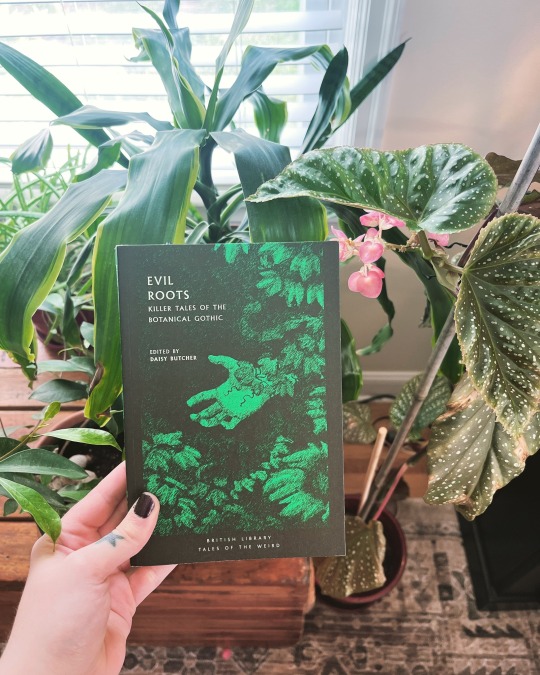
“We are surrounded by forces that technology cannot yet measure.”
—Charles Dowding
#godzilla reads#evil roots#Daisy butcher#evil roots: killer tales of the botanical gothic#British library#tales of the weird#reading#reads#quotes#bookworm#booklr#bookish#book blog#books and plants
101 notes
·
View notes
Text
Review: "Evil Roots: Killer Tales of the Botanical Gothic"

Authors: Nathaniel Hawthorne, Arthur Conan Doyle, Lucy H. Hooper, Charlotte Perkins Gilman, H. G. Wells, Edmond Nolcini, M. R. James, Ambrose Bierce, Howard R. Garis, William Hope Hodgson, Edith Nesbit, H. C. McNeile, Abraham Meritt, Emma Vane
Editor: Daisy Butcher
Date: 03/01/2023
Rating: ⭐⭐⭐⭐⭐
________________________________________________________
I think I ordered this book some time during summer, after I accidentally stumbled upon it on an online bookstore. I love anthologies and I love plants, so this title definitely intrigued me enough to order it. I finally decided to read it around Christmas and finished it during a recent trip, so it's officially my first finished book of the year.
"Evil Roots: Killer Tales of the Botanical Gothic" is an interesting anthology of short horror stories by quite a few well-known authors. From the creator of Sherlock Holmes, to the acclaimed writer of "The Yellow Wallpaper", all the way to the legendary H. G. Wells, this collections features some hidden gems of the late 19th and early 20th century. While the stories are certainly old-school, they could still be regarded as timeless classics and masterful creations.
Most stories revolve around the fascination of the exotic - of unknown plants that are in some way dangerous to humans (or other organisms) and which originate from far away places, like South America. There's mentions of exquisite poisonous flowers, murderous liana, mysterious wisteria, and the weirdest of them all - carnivorous plants.
It is interesting just how much the writers and, by default, the general public were fascinated by exotic flora which, in one way or another, transcended the known laws of nature. Plants were considered sedentary, passive, and at the bottom of the food chain, but as new discoveries were being presented and as more people, professionals and amateurs alike, from the western civilization started their expeditions in new places, society was being introduced with oddities that seemingly didn't follow any established rules. So while the horror in this collection is displayed through various flora, the true horror is derived from the simple fact that humans fear what they cannot understand. One of the most frightening things a person, especially a scientist, can experience is realizing that they will never be able to fully predict nature's capability to adapt and to evolve.
Of course, this theme goes hand in hand with the understanding that it is dangerous altering the natural order of things. While this could also be understood as criticism to the human tendency to play god, there isn't much religious commentary throughout the collection. The stories are centered around ecology, evolution, and biology, highlighting how humans shouldn't meddle with something as powerful as nature - which they will never fully understand, let alone be able to control. Even though the writers do create a feeling of dread through the fear of nature, the horror is actually realized through characters that underestimate its abilities and that have the need to disfigure nature in order to measure their own capabilities.
Furthermore, this collection highlights the uncomfortable fascination western civilization had with other cultures. The urge to study new exotic phenomena on their own accord, to test the limits of human science on something they don't fully understand with little to no regard of the laws of nature and the test subject's true needs, is somewhat perverse. These scientists are conducting experiments in uncontrolled environments, and playing with their test-subjects in order to test their own abilities and knowledge. It is a portrayal of poor research. They're acting out of curiosity with little to no regard of the consequences. It is not their subjects that are evil, for they have been brought up and mistreated in an environment completely unnatural to their habitat, but their tormentor, who butchers them through extreme studies. This is usually evident through a secondary character, most often a colleague, who tries to stop the scientist in their mad experiment before it's too late. The horror is, therefore, found in the abuse executed by the brazen oppressor, not in their vicious, abnormal creations.
The fact that the aforementioned themes barely scratch the surface of all the ideas featured in this collection, prove how layered and compelling all the featured stories are. The editor also did a marvelous job with a lovely foreword and an intriguing introduction to each of the authors and their respective work. Of course, as with every short story collection, not all works are equally strong, but "Evil Roots: Killer Tales of the Botanical Gothic" is still a gorgeous anthology and a noteworthy testament to a relatively overlooked category of horror.
#evil roots#evil roots: killer tales of the botanical gothic#daisy butcher#nathaniel hawthorne#arthur conan doyle#lucy h. hooper#lucy h hooper#charlotte perkins gilman#h g wells#edmond nolcini#m. r. james#h. g. wells#ambrose bierce#howard r. garis#howard r garris#william hope hodgson#edith nesbit#h. c. mcneile#m c mcneile#abraham merritt#emma vane#horror#botany#botanical horror#speculative fiction#review#book review#rc2024#2024#reading challenge
42 notes
·
View notes
Text
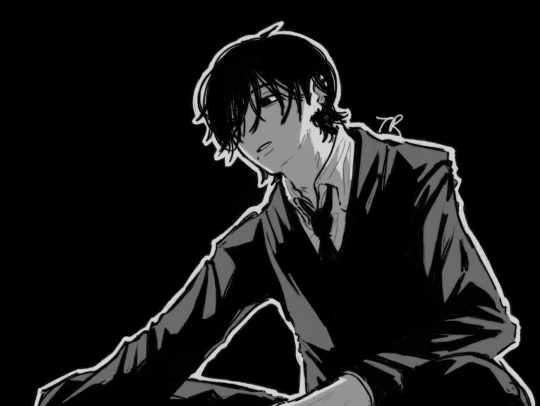

so silly this chapter hahahahhaha
#yoshida hirofumi#hirofumi yoshida#csm spoilers#chainsaw man spoilers#chainsaw man#csm#csm manga#chainsaw man part 2#csm 156#csm chapter 156#csm fanart#fanart#my art#yoshida in a suit is too powerful SORRY#doubles as perspective practice cause GOD i need to get more interesting with that shit#bbg is evil now and im rooting for him go yoshida go get his ass fuck it up yoshida
1K notes
·
View notes
Text
she's a 10 but she secretly wants repentance and redemption arcs for all the villains
#this is me rooting for rumplestiltskin to turn around and not be evil#hey at least in 1x19 he is able to SAY now that he's been a coward! he can admit to it! that's a step!#i don't know if that's delusional of me to think so but i certainly have HOPES for him and also for regina#songbird watches ouat
2K notes
·
View notes
Text
I would also love to add something about Lilith in regards to my theory about Roo owning Alastor (linked here).

We all know that Lilith and Alastor disappeared for the same period of time. We also know that Alastor sold his soul to an unbeknownst demon…and my other post is Eve/Roo holds Alastor captive but where does Lilith come in, you ask?
It has been stated already that Lilith hates being subservient to Adam and is said to be rebellious of whatever authority comes into her. With that being said I believe Roo took interest in both for their powers.

She is a “looming threat in the distance” and I have said something in the comments about when a character is disregarded or left in the dark for QUITE SOME TIME, usually they’d be a plot bomb. Just waiting for the perfect time to drop them and for people to go like “OHHH HOW COME I NEVER THOUGHT OF THAT!!” or “WHAT. I COMPLETELY FORGOT ABT THEM.”
She’s a landmine waiting to be triggered.
And with Alastor manifesting such raw power despite being a mortal soul, and Lilith being the ruler of hell. Roo absolutely loves chaos and evil and she saw potential in both characters.
MY THEORY is that Roo captured Lilith and Alastor, wanting them both to sell their souls to her but well of course! Lilith rejects Roo because that’s her personality; she LOATHES submission. She refuses to kneel for anyone.
And in order for her to escape Roo’s never ending pestering she makes a desperate deal with Adam, and that is for her to reside in heaven while in return Adam can exterminate her people. I feel like there’s a condition to it because why would Lilith care so much about not submitting that she would risk her people’s OR her own daughter’s life. Surely there’s a catch.
What do you think is the catch?🥲🤔
#hazbin hotel#alastor#radio demon#lucifer morningstar#charlie morningstar#hazbin hotel lilith#lilith morningstar#hazbin hotel roo#eve hazbin hotel#root of all evil#theory#episode 8#spoilers#spoiler alert#vaggie#niffty#hazbin hotel husk#angel dust
321 notes
·
View notes
Text


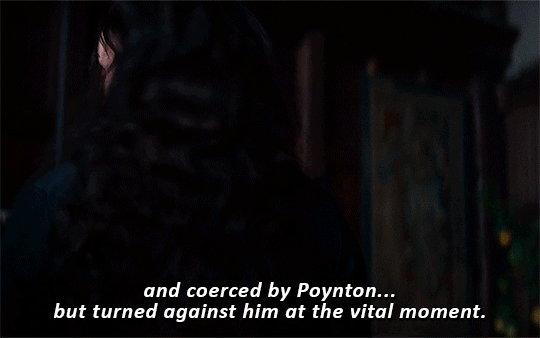



Renegade Nell - s01e08 "Not Some Cheap Trick"
#renegade nell#renegadenelledit#sofia is just... 100% in her fake it till you make it era#the whole season she just seems so out of her depth#she tries to take whatever power#whatever control she can get#but it's always so painfully obvious she's not in her element#i was almost rooting for her to get more evil#just so i could finally see her in control of her own situation#(also: her obsession with nell the whole season? gay)
261 notes
·
View notes
Text
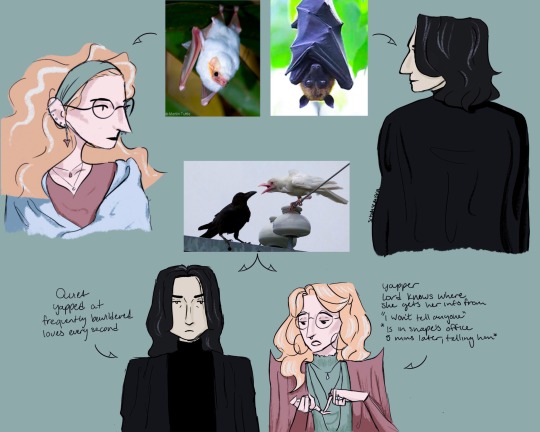
ravens and bats and the disliked professors
#severus snape#snape#professor snape#pro snape#snape fanart#sybill trelawney#trelawney#professor trelawney#trelawney fanart#i am a snape has greys TRUTHER .#also trelawney is a pisces compatible with sev’s capricorn. my vision is rooted in the stars#(and they’re both compatible with taurus (me) which speaks volumes)#their friendship is mainly giving each other special interest related things (raven) and switching who’s room they eat dinner in (bat)#i can save them both from everyone being evil to them#trelawneys treatment makes me feel like i need a padded cell
237 notes
·
View notes
Text






Person of Interest
5.01 — B.S.O.D.
#person of interest#poiedit#tvedit#scifiedit#harold finch#root#samantha groves#nikolatexla#i'm giffing season 5!!! so many great scenes#i never ever thought root would be this good when i first saw her#i remember calling her evil and bitch lmao (affectionate)
209 notes
·
View notes
Text
08
by Reza Afshar

#tentacles#fhtagn#reza afshar#concept art#alien#creepy#sci fi#exploration#forest#trees#evil#roots#creature#horror#monster#fhtagnnn
201 notes
·
View notes
Text
Look, I unapologetically love Raphael BG3 and I will forever be angry how he gets shafted for the plot (even if it is appropriately extra).
I want to ramble about why I love his ego though, because the way he acts hits different if you consider where it might come from. (Literally all the spoilers, obviously).
Raphael is just a cambion - half human, and therefore fallible, to the point that it's one of the first things your level 3 party comments on immediately after meeting him. The actual disrespect!
He's the son of Mephistopheles, who seems to be at best a very absent parent. Despite it being implied that Mephisto knows Raphael is plotting to try and take over the Hells, the most he does to stop it is sending him an incubus to distract him. None of the Archdevils show any other interest in stopping him at any point. There is a good chance that in the majority of playthroughs, the upstart heroes he's been trying to deal with will instead decide to just rob him blind instead of working with him - in no small part because they think they can.
Sure, he writes his own planar domination fanfiction, he's dramatic and ostentatious, but why? No one else takes him seriously. He's just a cambion. He's just Raphael. He has to be his own hype man because literally no one else will be. Mark my words, mans has an inferiority complex at the root of that ego. I, for one, respect the hustle.
#bg3 raphael#bg3 spoilers#bg3 meta#did I think i'd end up with kenough parallels when starting his character analysis?#no#i just have a lot of feelings about raph#he's a fascinating bastard#i both feel bad for him and think he deserves it#root cause of evil: not hugged enough as a child
418 notes
·
View notes
Text
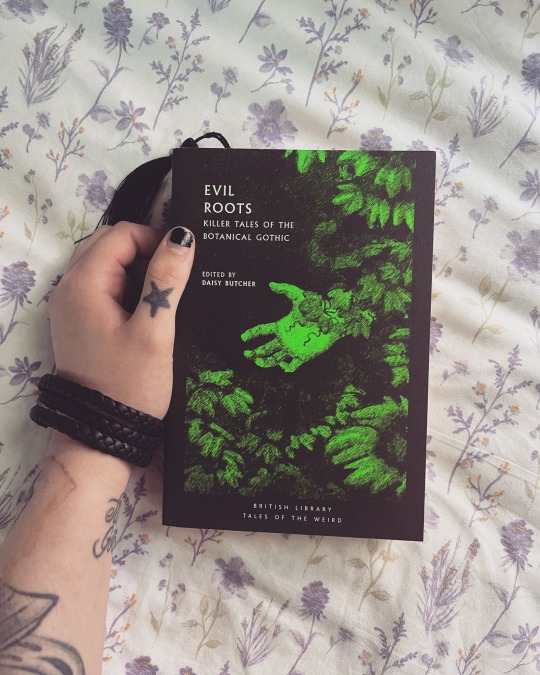
Up next is “Carnivorine” by Lucy H. Hooper, a tale of a scientific man gone missing, and when found is on the brink of a masterful discovery.
#godzilla reads#evil roots#Daisy butcher#british library#tales of the weird#reading#book blog#killer plants#bookish#bookworm
73 notes
·
View notes
Text
I was rewatching HB with my family, AND LIKE I know people have pointed out The Root of Evil is name dropped

BUT I have not seen anyone point out we got a symbol, and eye and root imagery on a ritual pyre???? HELLO???
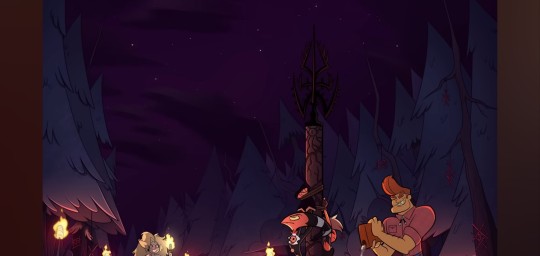
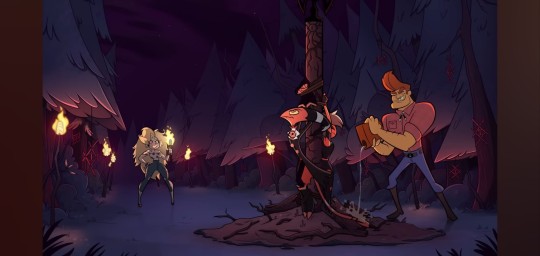
To me it reminded me of the pose Alastor makes in the Adam fight. And looking at it, I can see a vague familiarity especially if you count the antlers, but its not 100% the same


My sister says to her the symbol looks like a six winged angel falling

#Helluva Boss#Hazbin Hotel#hazbin hotel theory#helluva boss theory#Hazbin Hotel Roo#the root of all evil#I enjoy theorizing
162 notes
·
View notes
Text
Paradise Lost: How John Milton's 1667 work influenced "Hazbin Hotel"
I've been thinking about why the "fruit of knowledge" in Hazbin Hotel is depicted as an apple, as opposed to another fruit that would've been more accurate to the Middle East during the Fall of Man, as well as how Paradise Lost by John Milton (1667) influenced the show.
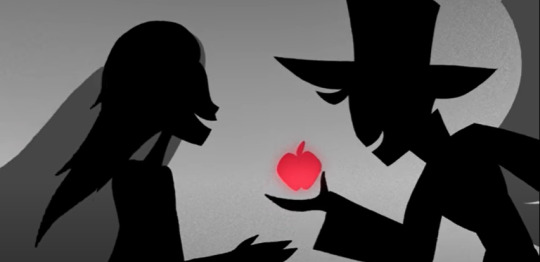
Per one source:
"Because the Hebrew Bible describes the forbidden fruit only as 'peri', the term for general fruit, no one knows [what exactly type of fruit it was]. It could be a fruit that doesn't exist anymore. Historians have speculated it may have been any one of these fruits: pomegranate, mango, fig, grapes, etrog or citron, carob, pear, quince, or mushroom."
Per Wikipedia:
"The pseudepigraphic Book of Enoch describes the tree of knowledge: 'It was like a species of the Tamarind tree, bearing fruit which resembled grapes extremely fine; and its fragrance extended to a considerable distance. I exclaimed, How beautiful is this tree, and how delightful is its appearance!' (1 Enoch 31:4)."
In Jewish and Islamic traditions, the "fruit of knowledge" is commonly identified with grapes. The Zohar explains that Noah attempted (but failed) to rectify the sin of Adam by using grape wine for holy purposes. Today, the "Noah grape" is still used to make white wine.

Furthermore:
"The association of the pomegranate with knowledge of the underworld as provided in the Ancient Greek legend of Hades and Persephone may also have given rise to an association with knowledge of the 'otherworld', tying-in with knowledge that is forbidden to mortals. It is also believed Hades offered Persephone a pomegranate to force her to stay with him in the underworld for 6 months of the year. Hades is the Greek god of the underworld, and the Bible states that whoever eats the forbidden fruit shall die."
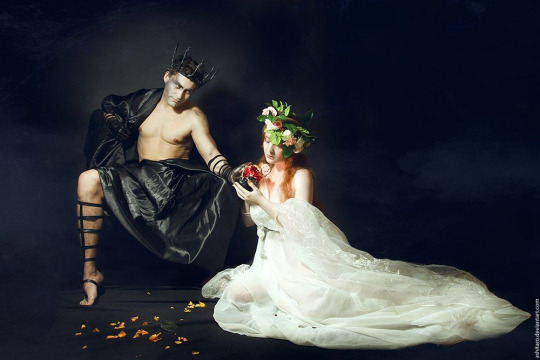
So, how then did the apple become the foremost symbol of the "fruit of knowledge"? You can partly thank Paradise Lost by English poet John Milton, a work which the lore of Hazbin Hotel is based off of.
Milton published the book in 1667, a time when the hedonistic Restoration era was in full swing. The exiled King Charles II was restored to the throne as King of England in 1660, and was a party animal, with dozens of mistresses, and nicknamed both the "playboy prince" and "Old Rowley", the latter after his favorite lustful stallion.
However, the association of the "fruit of knowledge" began with a Latin pun long before Milton immortalized the association in Paradise Lost. Per the linked article above by Nina Martyris for NPR:
"In order to explain, we have to go all the way back to the fourth century A.D., when Pope Damasus ordered his leading scholar of scripture, Jerome, to translate the Hebrew Bible into Latin. Jerome's path-breaking, 15-year project, which resulted in the canonical 'Vulgate', used the Latin spoken by the common man. As it turned out, the Latin words for evil and apple are the same: 'malus'.
[...] When Jerome was translating the 'Tree of the Knowledge of Good and Evil', the word 'malus' snaked in. A brilliant but controversial theologian, Jerome was known for his hot temper, but he obviously also had a rather cool sense of humor.
'Jerome had several options,' says Robert Appelbaum, a professor of English literature at Sweden's Uppsala University. 'But he hit upon the idea of translating 'peri' as 'malus', which in Latin has two very different meanings. As an adjective, 'malus' means 'bad' or 'evil'. As a noun it seems to mean an apple, in our own sense of the word, coming from the very common tree now known officially as the 'Malus pumila'. So Jerome came up with a very good pun.'
The story doesn't end there. 'To complicate things even more,' says Appelbaum, 'the word 'malus' in Jerome's time, and for a long time after, could refer to any fleshy seed-bearing fruit. A pear was a kind of 'malus'. So was the fig, the peach, and so forth.'
Which explains why Michelangelo's Sistine Chapel fresco features a serpent coiled around a fig tree. But the apple began to dominate Fall artworks in Europe after the German artist Albrecht Dürer's famous 1504 engraving depicted the First Couple counterpoised beside an apple tree. It became a template for future artists such as Lucas Cranach the Elder, whose luminous Adam and Eve painting is hung with apples that glow like rubies.
Milton, then, was only following cultural tradition. But he was a renowned Cambridge intellectual fluent in Latin, Greek and Hebrew, who served as secretary for foreign tongues to Oliver Cromwell during the Commonwealth. If anyone was aware of the 'malus' pun, it would be him, and yet he chose to run it with it. Why?
Appelbaum says that Milton's use of the term 'apple' was ambiguous. 'Even in Milton's time the word had two meanings: either what was our common apple, or, again, any fleshy seed-bearing fruit. Milton probably had in mind an ambiguously named object with a variety of connotations as well as denotations, most but not all of them associating the idea of the apple with a kind of innocence, though also with a kind of intoxication, since hard apple cider was a common English drink.'
It was only later readers of Milton, says Appelbaum, who thought of 'apple' as 'apple', and not any seed-bearing fruit. For them, the forbidden fruit became synonymous with the 'malus pumila'. As a widely read canonical work, 'Paradise Lost' was influential in cementing the role of apple in the Fall of Man story."
To tie this back into John Milton's relationship with King Charles II of England, as mentioned, Milton originally served Oliver Cromwell, Lord Protector of England, and the English Commonwealth, which was formed with the overthrow and execution of King Charles I on 30 January 1649, following the bloody English Civil War (1642 – 1651).
The King's two sons - the newly-christened King Charles II, the elder, and James, Duke of York (King James II), the younger - fled into exile on the European continent. However, with the death of Oliver Cromwell on 3 September 1658 came the 2-year-long dissolution of the English Commonwealth, and the restoration of the monarchy.
As for Milton himself, we can look to an article by Bill Potter.
Milton, born on 9 December 1608, was around 51-52 years old when King Charles II was restored to the throne. He attended Christ's Church, Cambridge in his youth, and mastered at least six languages, as well as history and philosophy; making him, perhaps, the most knowledgeable poet in history. He spent more than a year travelling across Europe, conversing with and learning from intellectuals, linguists, poets, and artists, including the famous Galileo Galilei.
However, Milton was a controversial figure of his time, being unafraid to criticize institutions of authority; arguing that "divorce was Biblical", for which he was routinely condemned; joining the Puritans; penning the Areopagitica, a treatise on liberty in favor of Parliament and the Roundhead rebels, during the reign of King Charles I, arguing that the King must be held accountable by the people; and agreed with and justified the murder of King Charles I, for which Parliament hired him in 1649 as a propagandist and correspondence secretary to foreign powers, on account of his fiery manifestos against "the man".
The collapse of the Commonwealth with the death of Oliver Cromwell in 1658 did not deter Milton from continued political writing against the monarchy and the new public sentiment that brought about its Restoration under King Charles II in 1660. On the contrary, Milton - now totally blind, having lost his eyesight by the age of 44 in 1652, a decade earlier - began writing Paradise Lost in 1661, and spent the next six years dictating the work to transcribers.
A supporter of regicide, Milton was also forced into exile himself, and faked his own death, as Charles refused to pardon - and sought to execute - any of those directly involved with his father's murder. Milton's friends held a mock funeral for Milton on 27 August 1660, just months after the coronation of King Charles II on 23 April 1660.
King Charles II commented that he "applauded his [Milton's] policy in escaping the punishment of death [execution for treason] by a reasonable show of dying", but insisted on a public spectacle nonetheless by having Milton's writings burned by the public hangman.
After eventually obtaining a general pardon from King Charles II, Milton was imprisoned, and released, likely due to political friends in high places. He died, aged 64, in 1674. His theological views were sometimes considered heterodox by the best Puritans, and his political views came close to getting him executed on several occasions. His poetry, however, has endured as some of the greatest works in the English language, especially Paradise Lost; much of his greatest work was written during his 22 years of complete blindness.
One of the main factors in King Charles II deciding to grant a pardon to Milton was, ironically, Paradise Lost. While originally written by Milton as a scathing criticism of King Charles II and the monarchy - depicting Lucifer Morningstar as a sympathetic rebel against God, with King Charles II claiming that is right to rule came from "divine ordainment" - Charles II enjoyed the work, and authorized its publication on 20 August 1667. We know this because a 1668 copy of Paradise Lost in royal bindings by Samuel Mearne, bound lovingly in a fine red leather made of goat skins tanned with sumac, and stamped in gold with the royal cypher of King Charles II, was found. The endpapers bore a watermark with the royal arms of Charles II.
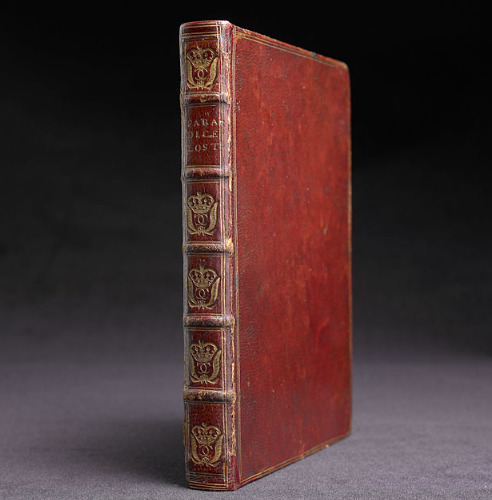
Per one Miltonian scholar: "The most single important event in Milton's life was the event against which he struggled most: the Restoration of Charles II, [and his relationship with the King]. Had it not come, we might have never had Paradise Lost...certainly, we should never have had [it] in [its] present power and significance."
Milton followed up Paradise Lost with Paradise Regained in 1671, three years before his death, with advice for King Charles II, urging the hedonistic Charles to "reign over himself and his passions":
"For therein stands the office of a King, His Honour, Vertue, Merit and chief Praise, That for the Publick all this weight he bears. Yet he who reigns within himself, and rules Passions, Desires, and Fears, is more a King; Which every wise and vertuous man attains: And who attains not, ill aspires to rule Cities of men, or head-strong Multitudes, Subject himself to Anarchy within, Or lawless passions in him which he serves." - John Milton, Paradise Regained, Book II, lines 463-472
To summarize: "If we must have a King back again, my Lord, please try to be a good man, unlike your father, who fell to his pride, [which was also the downfall of Lucifer]."
To quote another source: "Though the passage begins by noting that the office of a King is to bear the weight of public concerns, it is the control of one's private concerns that truly set a King apart as a virtuous character. Indeed, so important is self-command that any wise or virtuous man who attains it is like a king; any king who does not practice [self-command] is nothing more than a mere subject, ruled by anarchy and lawlessness."
Milton's words, too, echo a work written by Charles' grandfather, King James VI/I of Scotland and England: Basilikon Doron ("Royal Gift").
Per Wikipedia:
"'Basilikon Doron' (Βασιλικὸν Δῶρον) means 'royal gift' in Ancient Greek, and was written in the form of a private letter to James' eldest son, Henry, Duke of Rothesay (1594–1612). After Henry's death, James gave it to his second son, Charles, born 1600, later King Charles I. Seven copies were printed in Edinburgh in 1599, and it was republished in London in 1603, when it sold in the thousands.
This document is separated into three books, serving as general guidelines to follow to be an efficient monarch. The first describes a king's duty towards God as a Christian. The second focuses on the roles and responsibilities in office. The third concerns proper behaviour in daily life.
As the first part is concerned with being a good Christian, James instructed his son to love and respect God as well as to fear Him. Furthermore, it is essential to carefully study the Scripture (the Bible) and especially specific books in both the Old and New Testaments. Lastly, he must pray often and always be thankful for what God has given him.
In the second book, James encouraged his son to be a good king, as opposed to a tyrant, by establishing and executing laws as well as governing with justice and equality, such as by boosting the economy. The final portion of the Basilikon Doron focuses on the daily life of a monarch.
All of these guidelines composed an underlying code of conduct to be followed by all monarchs and heads of state to rule and govern efficiently. James assembled these directions as a result of his own experience and upbringing. He, therefore, offered the 'Basilikon Doron' ('Royal Gift') to his son, with the hope of rendering him a capable ruler, and perhaps to pass it down to future generations.
Overall, it repeats the argument for the divine right of kings, as set out in 'The True Law of Free Monarchies', which was also written by James. It warns against 'Papists' (Roman Catholics) and derides Puritans, in keeping with his philosophy of following a 'middle path', which is also reflected in the preface to the 1611 King James Bible. It also advocates removing the Apocrypha from the Bible."
King James VI/I further instructed his son and grandson:
"A good monarch must be well acquainted with his subjects, and so it would be wise to visit each of the kingdoms every three years."
"During war or armed conflict, he should choose old-but-good captains to lead an army of young and agile soldiers."
"In the court and the household, [a royal] should carefully select loyal gentlemen and servants to surround him. When the time came to choose a wife, it would be best if she were of the same religion and had a generous estate. However, she must not meddle with governmental politics, but perform her domestic duties."
"As for inheritance, to ensure stability, the kingdom should be left to the eldest son, not divided among all children."
"Lastly, it is most important...that [a royal] would know well his own craft...to properly govern over his subjects. To do so, [one] must study the laws of the kingdom, and actively participate in the council. Furthermore, [one] must be acquainted with mathematics for military purposes, and world history for foreign policy."
"[A royal] must also not drink and sleep excessively. His wardrobe should always be clean and proper, and he must never let his hair and nails grow long. In his writing and speech, he should use honest and plain language."
King James VI/I further supplemented Basilikon Doron with a written treatise titled The True Law of Free Monarchies: Or, The Reciprocal and Mutual Duty Between a Free King and His Natural Subjects.
"It is believed King James VI/I wrote the tract to set forth his idea of absolutist monarchism in clear contrast to the contractarian views espoused by, among others, James' tutor George Buchanan (in 'De Jure Regni apud Scotos'), [which] held the idea that monarchs rule in accordance of some sort of social contract with their people. James saw the divine right of kings as an extension of the apostolic succession, as both not being subjected by humanly laws."
Milton's own Areopagitica was a follow-up on De Jure Regni apid Scotos by George Buchanan, and also to The True Law of Free Monarchies, as well as the idea of the "divine right of kings". It takes its title in part from Areopagitikos (Greek: Ἀρεοπαγιτικός), a speech written by Athenian orator Isocrates in the 4th century BC.
Most importantly, Milton also wrote on the concept of free will: "Milton's ideas were ahead of his time in the sense that he anticipated the arguments of later advocates of freedom of the press by relating the concept of free will, and choice to individual expression and right."
The concept of free will, too, was a major topic explored in Paradise Lost. Per one source: "In 'Paradise Lost', Milton argues that though God foresaw the Fall of Man, he still didn't influence Adam and Eve's free will. [...] God specifically says that he gives his creatures the option to serve or disobey, as he wants obedience that is freely given [or chosen], not forced. Some critics have claimed that the God of the poem undercuts his own arguments; however, Milton did not believe in the Calvinistic idea of 'predestination' (that God has already decided who is going to Hell and who to Heaven), but he often comes close to describing a Calvinistic God. God purposefully lets Lucifer (Satan) escape Hell, and sneak past Uriel into the Garden of Eden, and basically orchestrates the whole situation so that humanity can be easily ruined by a single disobedient act. In describing the Fall of Man before it happens, God already predicts how he will remedy it, and give greater glory to himself by sending his Son [Jesus Christ] to die, and restore the order of Heaven."
In Hazbin Hotel, Adam also describes the Calvinistic idea of 'predestination', and that "the rules are black and white":

However, "This possible predestination leads to the theory of the 'fortunate fall', which is based on Adam's delight at learning of the eventual coming of the Messiah [from his bloodline]. This idea says that God allowed the Fall of Man, so that he could bring good out of it, possibly more good than would have occurred without the Fall, and be able to show his love and power through the incarnation of his Son. In this way, the free will of Adam and Eve (and Lucifer/Satan) remains basically free, but still fits into God's overarching plan."
However, there is one major flaw with this, and that is that we don't know if Jesus Christ exists within the Hazbin Hotel universe or not. Yet Charlie Morningstar, the daughter of Lucifer Morningstar and Lilith, and the "Princess of Hell", is depicted as a savior-esque figure within the show who, like God in Paradise Lost, encourages lowly sinners to choose obedience to God out of their own free will. More interestingly, Charlie does not come from Adam's bloodline; yet, while Lucifer decries 'free will', Charlie supports 'free will' instead.
Perhaps is is merely because Charlie, being the daughter of Lucifer and Lilith, claims to want to fulfill Lilith's "dream" of humanity being empowered in Hell ("The mind is its own place, it can make Heaven out of Hell, or Hell out of Heaven" - Lucifer, Paradise Lost); however, I think it also stems from Charlie having a genuine belief that 'free will', and people choosing to do good instead of evil, is "good" and "Godly".
True to Paradise Lost, this is also in fulfillment of God's plan; and, according to one fanfiction, why God allowed Charlie to be born to Lucifer and Lilith, so that sinners may be redeemed through Charlie.
For more on differing interpretations of 'free will', I suggest reading: "Free Will and the Diminishing Importance of God's Will: A Study of Paradise Lost and Supernatural" by Kimberly Batchelor (2016)
Excerpt: "'Paradise Lost' –and Milton’s purpose for writing the poem— is rooted deeply in postreformation Arminianism and this is apparent in its employment of free will. Chapter 1 argues that Milton turns to free will as a tool to justify the actions of God. Freedom of choice is God-given, and sets up a morality in which right and wrong are dictated by God. Chapter 2 shows that in 'Supernatural', free will is not given by a higher power; and, in fact, free choice functions as an act of defiance against God's will."
This raises the question: Is 'free will' given by God, using Lucifer as his vessel, in Hazbin Hotel, as in Paradise Lost? Or is 'free will' not given by a higher power; and, in fact, an act of defiance against God?
This brings us back around to our first question: Why is an apple, or 'malus', used to depict the "fruit of knowledge", especially if 'malus' means 'bad or evil', whereas Milton depicts 'free will' as God-given?
Well, for one, Lucifer still chooses to associate himself with apple symbolism and imagery, despite being skeptical of free will:
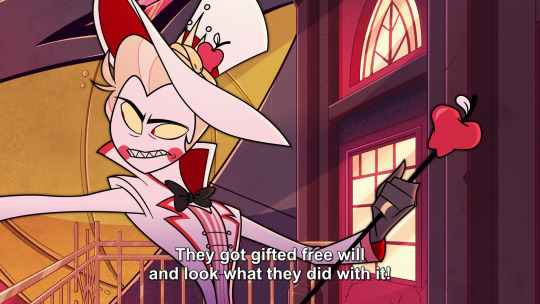

Based on the introduction to Episode 1, Charlie also views 'free will' as a gift (Miltonian), whereas Lucifer appears to view it as a curse.
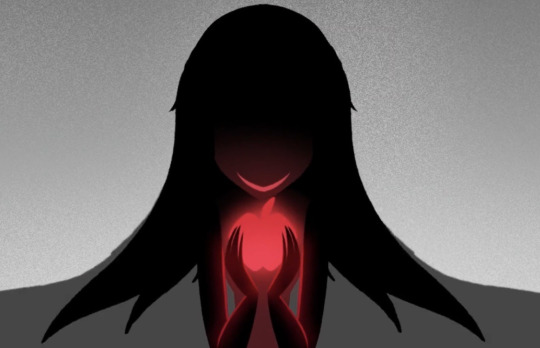
However, Charlie also notes that it was through the 'gift' of free will that the "root of all evil" entered the world, for if mankind could choose to be good, then they could also choose to be evil ('malus').
John Milton states in Paradise Lost: "Of Man's First Disobedience, and the Fruit Of that Forbidden Tree [malus], whose mortal taste Brought Death (evil, malus) into the World, and all our woe."
Thus, the use of an apple specifically is likely a tie-in to what others have been speculating about a character that series creator Vivienne Medrano (Vivziepop) alluded to a while back: "The Root of All Evil".
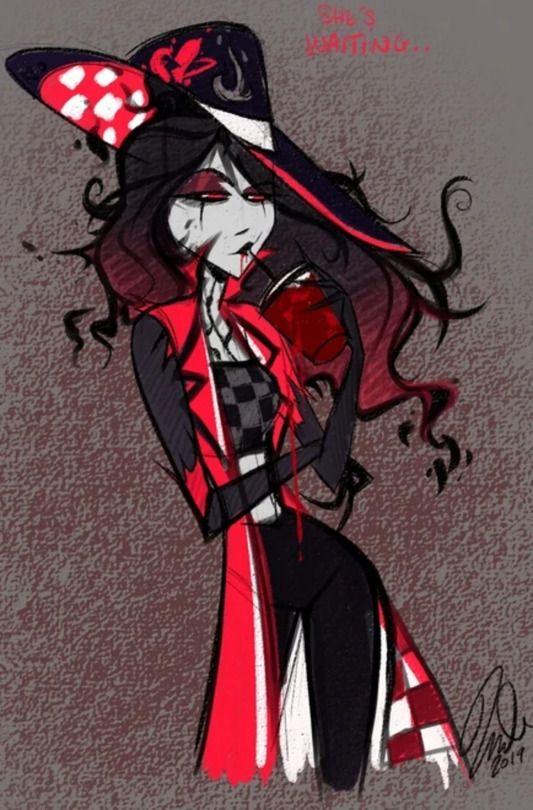
However, "Roo" itself is depicted as possessing the body of a human woman, presumably Eve, the first one to eat the "fruit of knowledge":
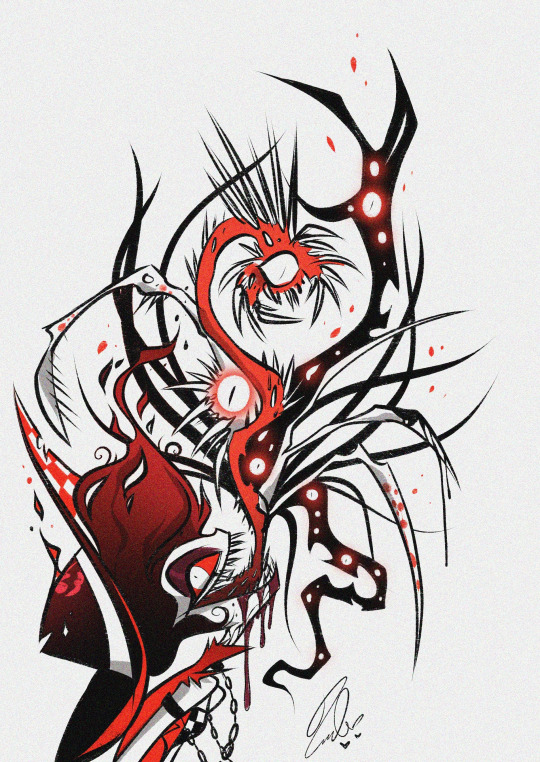
Thus, we can discern that "Malus" likely refers to this character. (Also see: "Maleficent", a name that also uses the root word "mal", "evil".) As for Roo's intentions, if Charlie is "good" - and, if, in fact, Alastor was sent by "Roo" (Eve) - then they may want for Alastor to work on their behalf to "corrupt" Charlie, or make sure the hotel never succeeds.
This is because demonic power is tied to human souls, and there are "millions of souls" in Hell, which likely fuels the great power of "Roo". The more souls there are in Hell, the more powerful "Roo" becomes. The Overlords also get their demonic power from "millions of souls".

The deal between Eve and "Roo" might even be the first contract, or deal, between a human soul and a demonic entity; in exchange for 'free will', and the knowledge of good and evil, Eve allowed the "Root of All Evil" to inhabit her body, and to escape the void or prison it was confined to by Heaven (Hell?). (For one cannot be 'all-good' unless you attempt to 'eliminate' or 'ablate' evil; and, in Greek mythology, Zeus imprisoned the Titans in Tartarus for all of their evil deeds.)
Another possibility, brought up in an article by Gillian Osborne, is that Lucifer sees the "fruit of knowledge" as an apple, but it may appear as different fruits to different people, depending on how they view it. This also fits with Lucifer and angels being able to easily shapeshift.
In Paradise Lost, only Lucifer describes the fruit as an "apple" (malus), as he associates malus with "bad, evil", while the narrator also describes the fruit as "a mix of different colors" and peach-like. This then begs the question: "Did the fruit of knowledge of good and evil become 'evil' because Eve harbored resentment towards Adam?"
Quote: "Lucifer (Satan) gives Eve yet another hint that this tree may be more complicated than he wishes her to believe: although elsewhere in Milton's poem Eden is heady with its own newness, sprouting spring flowers left and right, the tree of knowledge is already old: its trunk is 'mossie'. Nevertheless, Lucifer claims to wind himself around the tree 'soon'; the quickness of his reported arrival stands in contrast to the timescales required to cover a fruit tree with moss (PL 9.589). Placing Lucifer's winding body between these two timescales—an easeful present and the inhuman scale of natural history—Milton suggests that there is something dangerous in entangling the past with the present. Yet, 'Paradise Lost' also makes deep biblical history feel like present politics for its readers. When Adam and Eve wander out of Eden at the end of the poem, they famously make their way not only into an earthly paradise, but also into the present. Eden's mossy apple tree therefore represents the pitfalls of conflating nature and history, of seeing any action in human history—even Eve's eating of an apple—as natural, if by nature, we mean inevitability. For Milton, history, unlike nature, is directed by humans, progressive, and, like the reading of 'Paradise Lost', hard work. While trees may inevitably collect moss the longer they live, Adam and Eve's labors in the garden, and our labors of reading, require agency and effort. Milton's poem refuses mourning the loss of Eden, [and the perfection of Heaven], in favor of a perpetual, melancholic, recreation of paradise: a present perfecting."
To quote Twisted: The Untold Story of a Royal Vizier, which also draws inspiration from John Milton's Paradise Lost: "It's an unfortunate situation...but you do have a choice [i.e. free will]."
#hazbin hotel#hazbin hotel analysis#hazbin#hazbin analysis#hazbin hotel meta#hazbin meta#hazbin hotel theory#hazbin theory#deep thoughts#john milton#paradise lost#eve hazbin hotel#lucifer hazbin hotel#lucifer morningstar#adam hazbin hotel#lilith hazbin hotel#lilith morningstar#roo hazbin hotel#root of all evil
205 notes
·
View notes
Text



LAZY BUT I WANTED TO BE EARLY SO BAD
#pi bfb#pi xfohv#square root bfb#square root xfohv#eight bfb#eight xfohv#two tpot#six bfb#six xfohv#bfb#bfdi#tpot#xfohv#osc#algebralien short spoilers??#my art#eleanors ancient sea#mine#PI IS SOOOOOOO SILLAY.. EVIL CRITTER
182 notes
·
View notes
Text
All the fanfic readers/writers, after finding out they can't read their before-bed fanfics, and escape reality for a little bit, because ao3 is down:

#ao3#i had a really tiring day today too#😭#ao3 problems#hopefully the ao3 team can get it back up soon#we're all rooting for you#ao3 volunteers#why would anyone do this#the evil in this world truly knows no bounds!#fanfiction#fanfic#fanfiction reader problems#fanfiction writer problems#help us!#also#if you have the money#please donate to ao3 and it's (volenteers) staff#they work so hard to both keep the site running smoothly for us and defend it from cyber attacks like this one#so please support them!
492 notes
·
View notes
Text
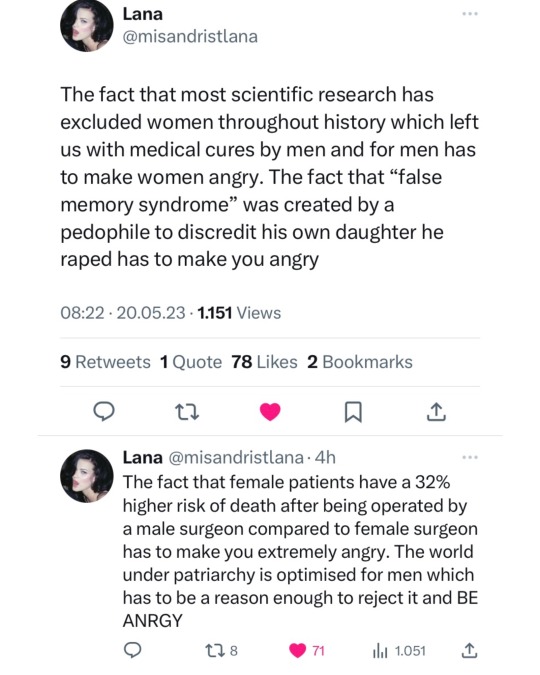
The entire world is designed around men and their degeneracy, yet misogyny isn’t acknowledged as the serious problem it is. People always throw in other issues which are results of the fact that males put themselves into a position of power where they don’t belong, but women‘s issues are usually treated as an afterthought or as something that "might be bad but not THAT bad".
As soon as we threaten men‘s status quo, we‘re exaggerating and a million things they project onto us.
#radfem#radblr#women deserve better#radical feminism#feminism#radfems do touch#radfems do interact#radfems please touch#womens rights#sex based rights#womens health#misogyny is the ultimate evil#and patriarchy is the root that needs to be eradicated
1K notes
·
View notes